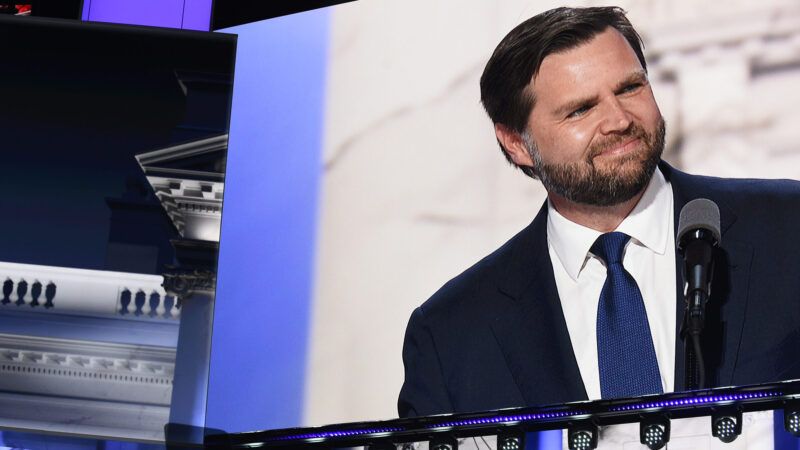J.D. Vance Says Childless Americans Should Pay Higher Taxes. They Already Do.
Donald Trump's running mate has discovered the most politically toxic way to demand the status quo.

In comments from 2021 that resurfaced last week, Sen. J.D. Vance (R–Ohio) said that childless Americans ought to pay higher taxes than those who have kids.
"If you're making $100,000 [or] $400,000 a year, and you've got three kids, you should pay a different, lower tax rate than if you're making the same amount of money and you don't have kids," Vance said back then, during an interview with conservative activist and podcaster Charlie Kirk.
Here's the good news for Vance: It's already true that childless Americans pay higher taxes than most of those who reproduce. That was true in 2021, and it is true today.
That's because of the child tax credit, which has existed since 1997 and has been partially refundable since 2001. For each dependent that can be claimed, a tax filer gets up to $2,000 credit—with up to $1,400 of that total being refundable, meaning that it gets paid out even if the filer doesn't owe any taxes. As part of the tax reform package passed by Republicans during the Trump administration, the child tax credit was doubled from $1,000 per kid to the current level.
To use Vance's own example: An individual who earns $100,000 and has three kids would qualify for $6,000 in child tax credits. A childless person who also earns $100,000 would not get those credits and would therefore pay a higher effective tax rate.
There's one small wrinkle that's worth pointing out: As currently structured, the child tax credit phases out at a rate of 5 percent for individuals who earn over $200,000 annually and couples who earn over $400,000. That means that every additional dollar earned beyond those thresholds qualifies for 5 cents less in tax credits. The maximum tax credit is $2,000, so by the time you've earned $40,000 additional dollars (as a single filer) or $80,000 additional dollars (as a joint filer), you get zero child tax credit. The most charitable reading of Vance's comments is to assume he wants to expand eligibility for the child tax credit so even wealthy families earning over $400,000 annually can access it.
Vice President Kamala Harris' campaign and other Democratic-aligned groups blasted Vance's comments around the internet last week to frame former President Donald Trump's running mate as being unfriendly to childless Americans. That's a fair critique, but there are at least two bigger problems here for Vance.
First, his apparent ignorance of how the current tax code rewards people for having kids undermines his status as the supposed policy wonk on the Republican ticket. Maybe it's a good idea to create tax-based incentives for Americans to have kids, or maybe it isn't—regardless, it's certainly not a novel idea that only a guy who grew up in Real America could have.
This is a little bit like a Democrat running for office in 2024 on a promise to mandate that all Americans have health insurance. You'd wonder if they'd been paying attention.
It's also worth considering how Vance, in that 2021 interview, puts this idea into the context of what the populist right is trying to achieve. Parents should pay lower taxes than nonparents, he told Kirk, because policy ought to "reward the things that we think are good" and "punish the things that we think are bad."
Again, he treats this as if it is a radical break from the status quo, when, in fact, it simply is the status quo. But instead of talking about why parents might deserve to pay less in taxes, he's eager to turn the issue into an us-vs.-them dynamic in order to justify a tax hike.
The second problem is even more revealing in what it illustrates about Vance's skills as a politician. Again, keep in mind that the policy he's proposing already exists. Most politicians would describe the status quo as being a tax break for parents. Vance, however, is eager to frame this idea as a tax hike on childless adults.
Both are true, but only one of those is likely to generate a response like this from Barstool Sports founder Dave Portnoy, who seems like exactly the target audience for Vance's edgy, tough guy act:
This is fucking idiotic. You want me to pay more taxes to take care of other people's kids? We sure this dude is a Republican? Sounds like a moron. If you can't afford a big family don't have a ton of kids. pic.twitter.com/oPCYMkq3G1
— Dave Portnoy (@stoolpresidente) July 26, 2024
Portnoy's reaction seems pretty rational for anyone who hasn't been steeped in tax policy. As Dominic Pino points out at National Review, Americans aren't generally a fan of politicians "siccing the government on a subset of the population." From a Republican perspective, this was a completely unforced rhetorical error by Vance.
More generally, Vance's comments from 2021 leave the impression that "at some level Mr. Vance really doesn't respect people who make different life choices," opines The Wall Street Journal's editorial board, who compared the moment to Hillary Clinton's infamous gaff when she described Trump supporters as "deplorable."
I'd argue that Vance's comments are a bit worse than how the Journal describes them. As a childless adult, I am admittedly a bit biased here—but the problem isn't merely that Vance disrespects that decision. It's that he actively wants to, in his own words, "punish" it.
In this case, the federal tax code is already doing the punishing that Vance wants to dish out. So the only thing Vance has accomplished is finding the most politically toxic way to describe an existing, bipartisan policy.
In doing so, however, he revealed a nasty part of his character and his views on how government should work. Americans should notice that.


Show Comments (171)